Divorce
Breaking Up Housekeeping
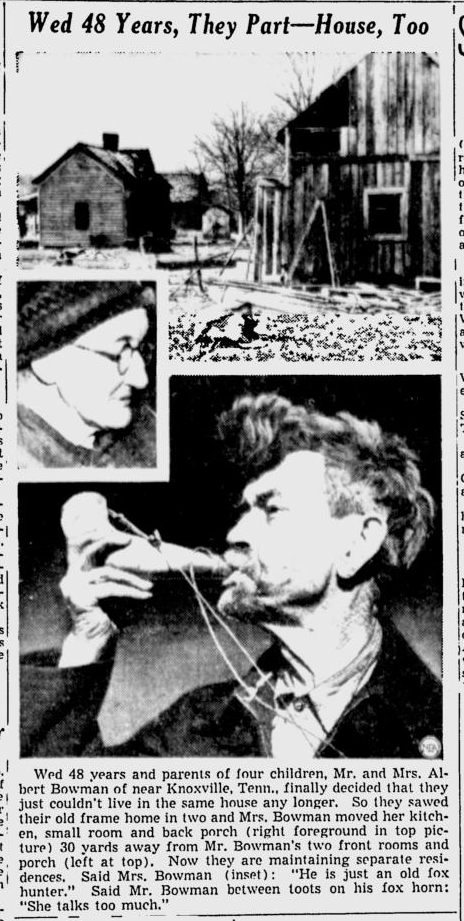
Article source.
Posted By: Paul - Sun Jan 12, 2020 -
Comments (0)
Category: Architecture, Domestic, Divorce, Interior Decorating, 1930s
Divorce, The Magazine for People Starting Over
Back in 1987, twice-divorced Manhattan lawyer Daniel Hirsch got the idea that divorcees were a potentially untapped audience for a magazine. As he described it:Hirsch managed to get investors to back his idea, but it never made it to a first issue. Apparently it had trouble attracting advertisers. This Washington Post article explains the skepticism about the idea:
But it seems like it can't have been that bad of an idea because some googling reveals that there is in fact a Divorce magazine that's been in existence since 1996, and still seems to be going strong.
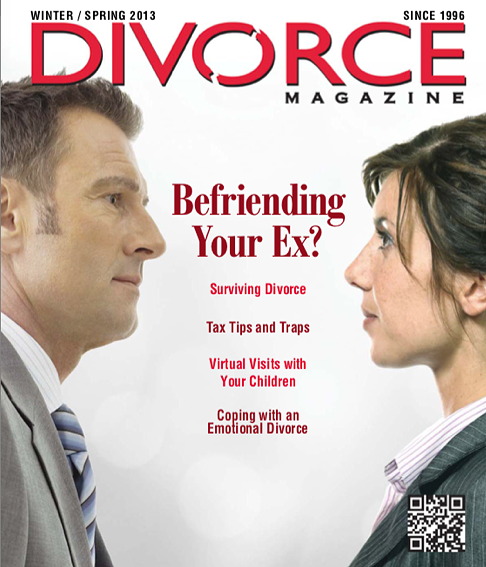
Posted By: Alex - Fri Nov 09, 2018 -
Comments (0)
Category: Magazines, Divorce
Reno Divorce Myth
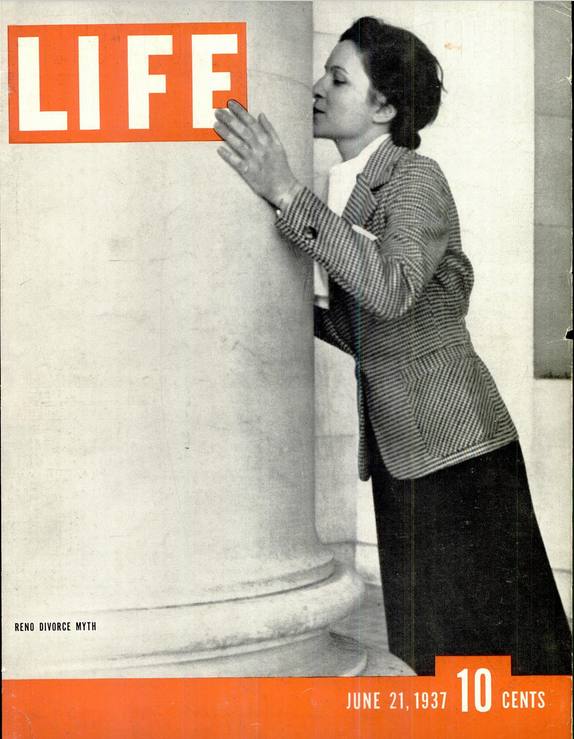
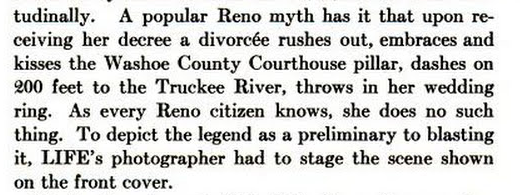
Original photo and article here.
Posted By: Paul - Fri Jun 09, 2017 -
Comments (2)
Category: Customs, Regionalism, Divorce, 1930s
Left by wife, becomes caveman
There's two ways to read this. Either this guy really took the break-up hard. Or, after his wife left him, he decided to live exactly as he wanted, and he was the happiest man in the world.I suspect there's a lot of married men who would revert to a caveman-like existence (perhaps to a less extreme degree) without the influence of their wives.
The Deseret News noted that he was known only as "Darab." But otherwise there's no more info to be found about this mysterious, wifeless hermit.
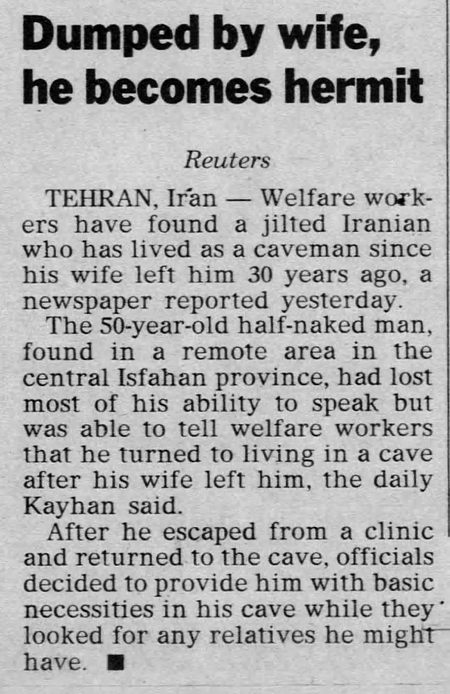
Philadelphia Daily News - Oct 24, 1996
Posted By: Alex - Tue May 02, 2017 -
Comments (2)
Category: Divorce, Marriage, 1990s
Divorcee banned from chess club
1971: 16-year-old Soni Romans was banned from all extracurricular activities at at Channelview High School in Houston. This included school choir, chess club, drama, and the National Honor Society. The reason for the ban was that she had been married and divorced and had a child (which she gave up for adoption). Therefore, the school felt that she shouldn't be allowed to participate in extracurricular activities because, during them, she "might discuss sex with other students."However, if she had simply had the child without getting married and divorced, the same regulation wouldn't have applied. Unwed mothers were free to participate in the extracurriculars. Romans sued the school and won, so the ban was eventually lifted.
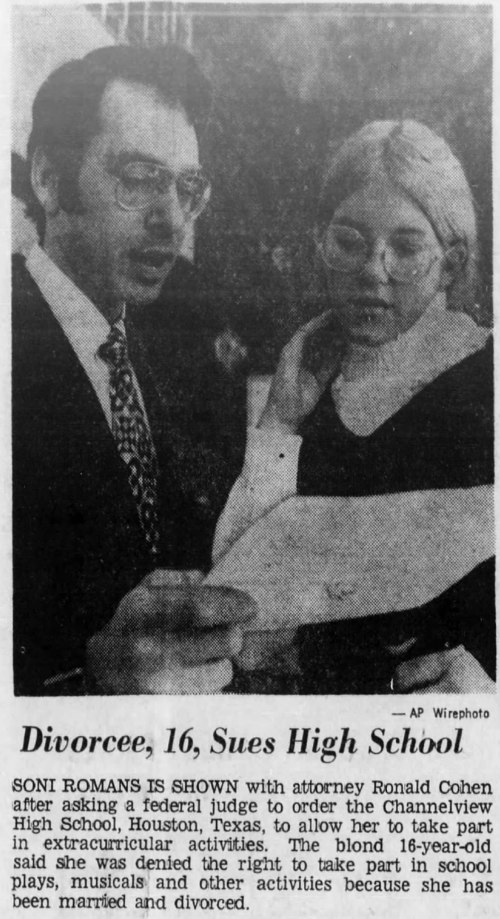
The Cincinnati Enquirer - Nov 14, 1971

The Akron Beacon Journal - Feb 17, 1972
Posted By: Alex - Sun Mar 19, 2017 -
Comments (3)
Category: School, Regulations, Divorce, 1970s
Who Gets the Beanie Babies?
November 1999: After filing for divorce, Frances and Harold Mountain proved unable to agree on how to split up their Beanie Baby collection. So Family Court Judge Gerald Hardcastle instructed them to bring the entire collection into the courtroom, spread them out on the floor, and pick one each until they were gone.The judge remarked, "This isn't about toys. It's about control. Because you folks can't solve it, it takes the services of a District Court judge, a bailiff and a court reporter."
Frances Mountain said, "I don't agree with the judge's decision to do this. It's ridiculous and embarrassing." Nevertheless, she got down on her hands and knees and started picking out Beanie Babies.
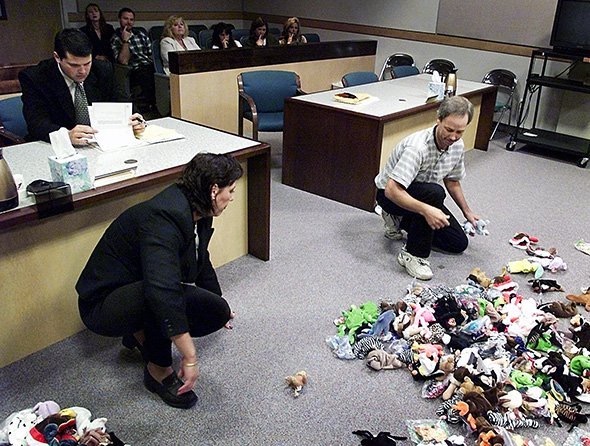
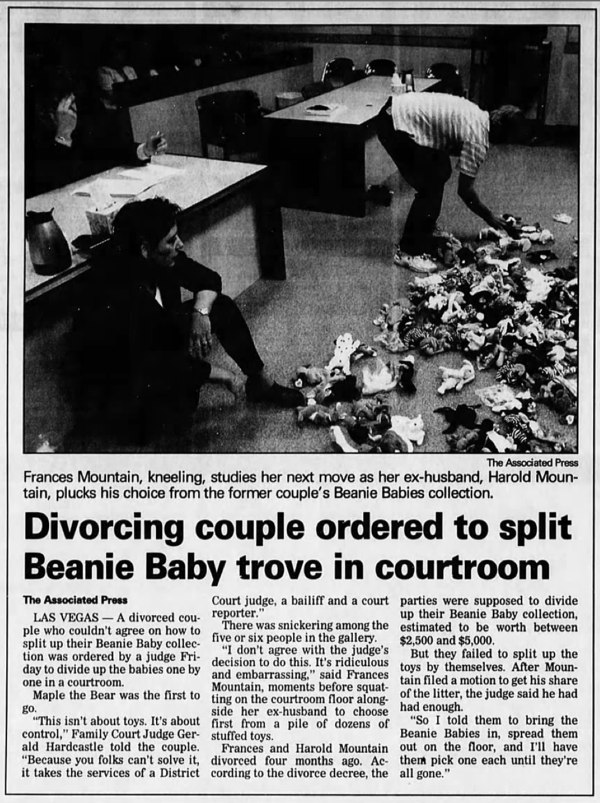
Santa Cruz Sentinel - Nov 6, 1999
Posted By: Alex - Sun Feb 19, 2017 -
Comments (5)
Category: Divorce, Collectors, 1990s
Husband Wields Occult Powers
September 1909: Mrs. Christina Brown of Elgin, Illinois filed for divorce from her husband on the grounds that he was a wizard who wielded occult powers, compelling her to do things against her will, such as:- Sitting for hours in one chair while he controlled her thoughts as well as actions without touch or word.
- Revealing the choicest bits of neighborhood gossip, no matter how solemnly she had sworn to keep them a secret.
- Telling him what she really thought of him, despite her effort to pretend that he was the only man in the world.
- Admitting that she didn't believe his fish stories.
- Confessing that she had cooked up the oldest and poorest food in the house when he brought a friend home to dinner unexpectedly.
- Purchasing a hat and gown at the cheapest store in town when she had fully intended to buy them at a more expensive establishment.
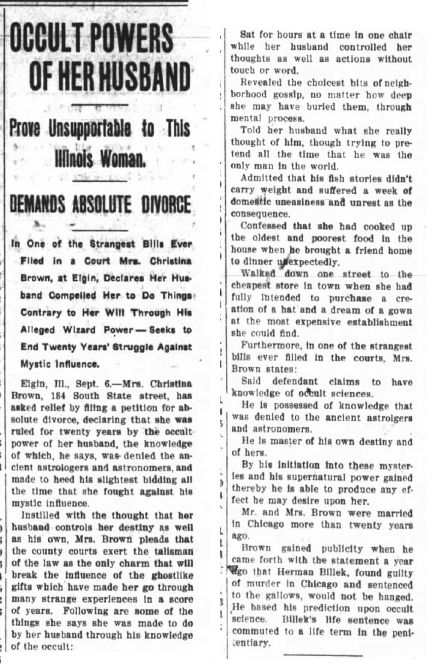
The Alexandria Times-Tribune - Sep 6, 1909
Posted By: Alex - Thu Jan 05, 2017 -
Comments (1)
Category: Divorce, 1900s
Paid half to ex-wife
Robert Lucas and Rita Cohen met while both were undergraduates at the University of Chicago, and they got married in 1959. They had two sons together, but eventually things didn't work out. They separated in 1982 and divorced a few years later, citing "irreconcilable differences."But Rita evidently had faith in Robert's talent, because she instructed her lawyer to add a clause to the divorce settlement specifying that if Robert won the Nobel Prize by October 31, 1995, she would receive half the prize money.
Robert was awarded the Nobel Prize in economics on October 10, 1995 — 21 days before the clause would have expired.
Asked about having to pay half the prize to his ex-wife, he noted philosophically that, "A deal is a deal." But added, "Maybe if I'd known I'd win, I would have resisted the clause."
More info: LA Times (Oct 21, 1995)
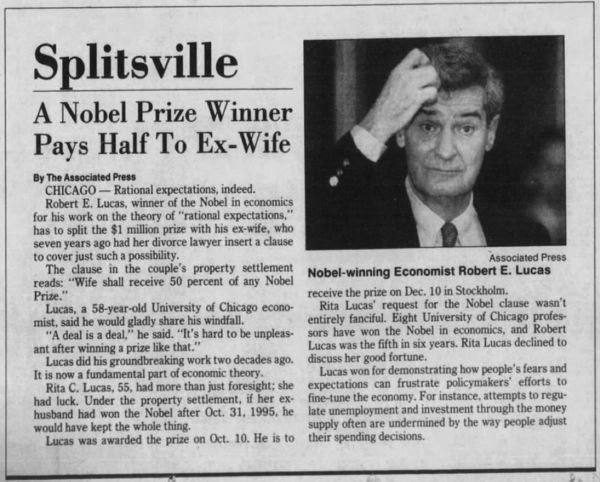
St. Louis Post-Dispatch - Oct 21, 1995
Posted By: Alex - Thu Aug 25, 2016 -
Comments (7)
Category: Awards, Prizes, Competitions and Contests, Divorce
Wife vs. Cats
The Crazy Cat Lady is the cultural stereotype (Archie McPhee even sells a Crazy Cat Lady action figure). But this story demonstrates that there are definitely Crazy Cat Men as well.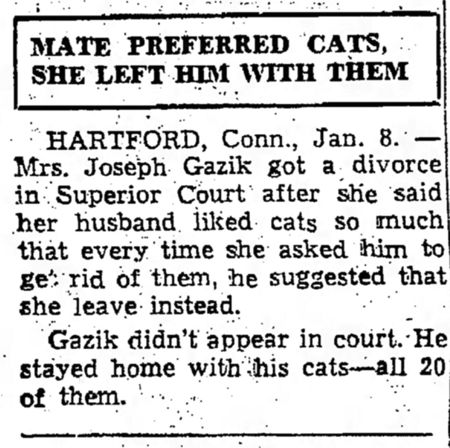
The Daily Courier (Connellsville, Pa) — Jan 8, 1954
HARTFORD, Conn., Jan. 8 — Mrs. Joseph Gazik got a divorce in Superior Court after she said her husband liked cats so much that every time she asked him to get rid of them, he suggested that she leave instead.
Gazik didn't appear in court. He stayed home with his cats — all 20 of them.
Posted By: Alex - Tue Jul 26, 2016 -
Comments (3)
Category: Divorce, Cats, 1950s
Mother-In-Law Beneath Bed
There's in-law problems, and then there's this: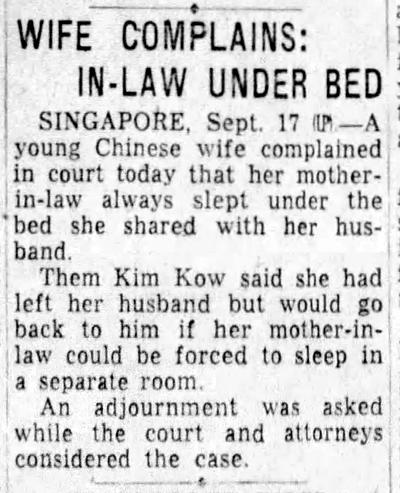
The Morning News (Wilmington, Delaware) - Sep 18, 1956
SINGAPORE, Sept. 17 — A young Chinese wife complained in court today that her mother-in-law always slept under the bed she shared with her husband.
Them Kim Kow said she had left her husband but would go back to him if her mother-in-law could be forced to sleep in a separate room.
An adjournment was asked while the court and attorneys considered the case.
Posted By: Alex - Thu Jul 14, 2016 -
Comments (4)
Category: Divorce, Marriage, 1950s

| Who We Are |
|---|
| Alex Boese Alex is the creator and curator of the Museum of Hoaxes. He's also the author of various weird, non-fiction, science-themed books such as Elephants on Acid and Psychedelic Apes. Paul Di Filippo Paul has been paid to put weird ideas into fictional form for over thirty years, in his career as a noted science fiction writer. He has recently begun blogging on many curious topics with three fellow writers at The Inferior 4+1. Contact Us |




